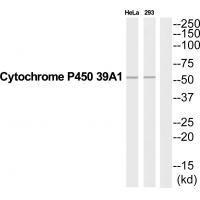
| WB | 咨询技术 | Human,Mouse,Rat |
| IF | 咨询技术 | Human,Mouse,Rat |
| IHC | 咨询技术 | Human,Mouse,Rat |
| ICC | 技术咨询 | Human,Mouse,Rat |
| FCM | 咨询技术 | Human,Mouse,Rat |
| Elisa | 咨询技术 | Human,Mouse,Rat |
| Aliases | 24-hydroxycholesterol 7-alpha-hydroxylase; CP39A; CYP39A1; Cytochrome P450 39A1; cytochrome P450 |
| Entrez GeneID | 51302; |
| WB Predicted band size | 54kDa |
| Host/Isotype | Rabbit IgG |
| Antibody Type | Primary antibody |
| Storage | Store at 4°C short term. Aliquot and store at -20°C long term. Avoid freeze/thaw cycles. |
| Species Reactivity | Human |
| Immunogen | Synthesized peptide derived from Internal of human CYP39A1. |
| Formulation | Purified antibody in PBS with 0.05% sodium azide. |
+ +
以下是关于CYP39A1抗体的3篇参考文献,涵盖其功能、调控及疾病关联研究:
---
1. **文献名称**:Cholesterol 24-hydroxylase (CYP39A1) as a genetic marker for cholesterol metabolism
**作者**:Li-Hawkins et al. (2000)
**摘要**:该研究通过基因敲除模型揭示CYP39A1在胆固醇代谢中的作用,使用特异性抗体检测其在肝脏和脑组织中的蛋白表达,证实其参与24-羟基胆固醇向胆酸的转化。
---
2. **文献名称**:Regulation of CYP39A1 expression by bile acids and cytokines in human hepatocytes
**作者**:Norlin & Wikvall (2007)
**摘要**:研究探讨胆汁酸和细胞因子对CYP39A1表达的调控机制,利用Western blot和免疫组化技术(基于兔多克隆抗体)验证其在肝细胞中的表达变化。
---
3. **文献名称**:Altered cholesterol metabolism in CYP39A1-deficient mice and its link to neurodegenerative diseases
**作者**:Bretillon et al. (2007)
**摘要**:通过CYP39A1缺陷小鼠模型,结合抗体检测脑组织蛋白水平,发现其缺失导致24-羟基胆固醇累积,提示与阿尔茨海默病等神经退行性病变的潜在关联。
---
如需技术类抗体开发文献,可补充公司技术文档(如Sigma-Aldrich抗体验证报告)。
CYP39A1 (Cytochrome P450 Family 39 Subfamily A Member 1) is an enzyme involved in cholesterol metabolism, specifically converting 24-hydroxycholesterol into bile acid precursors. It plays a critical role in maintaining cholesterol homeostasis by regulating the elimination of excess cholesterol from the brain and peripheral tissues. Dysregulation of CYP39A1 has been implicated in neurodegenerative disorders (e.g., Alzheimer’s disease), cardiovascular diseases, and metabolic syndromes, making it a research target for understanding lipid-related pathologies.
CYP39A1 antibodies are immunological tools designed to detect and quantify the expression of this enzyme in biological samples. These antibodies are typically produced in hosts like rabbits or mice using immunogenic peptides or recombinant protein fragments of CYP39A1. They are widely used in techniques such as Western blotting, immunohistochemistry (IHC), and immunofluorescence (IF) to study tissue-specific expression, subcellular localization, and altered protein levels in disease models. Validated antibodies help researchers explore CYP39A1's role in cholesterol clearance pathways, its interaction with lipid transporters, and its potential as a biomarker or therapeutic target. Commercial suppliers often provide specificity data, including knockout-validated batches, to ensure reliable experimental outcomes. Studies using these antibodies have contributed to insights into how CYP39A1 dysfunction may promote neurodegeneration or atherosclerosis through impaired oxysterol metabolism.
×